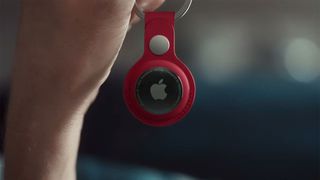Apple AirTags exist! Here's what you need to know
At long last, the Apple AirTags have finally been announced

After more than a year of rumors and speculation, Apple has finally announced the AirTags. The Bluetooth-connected, tracking device is designed to be attached to those things that tend to go missing at the drop of a hat. You know, things like your keys, remote control, wallet or smartphone. Available starting April 30, the AirTags are priced at an affordable $29 for a single device or $99 for a four-pack.

Apple AirTags design
The AirTag isn't much to look at, or so it seems at first glance. It has a small circular design that looks to be about the size of a silver dollar. The tracker has an IP67 rating, meaning it's both dust and water resistant. In order to add some fun and personalization to the design, Apple is giving consumers the option to engrave your name or even an emoji onto the AirTags. Underneath the hood you have an accelerometer, speaker and Bluetooth LE. Even better, it has a replaceable battery. There's also a NFC chip so you can tap to enable a lost mode.

Apple AirTags: how they work
Similar to Tile, you can attach the circular AirTags to your stuff and use an app to quickly track down your lost items. But it wouldn’t be Apple without some of the company’s proprietary technology. In the case of the AirTags, the trackers use Precision Finding. Similar to other Apple products, AirTags are equipped with Apple’s U1 chip which uses an Ultra Wideband (UWB) radio, technology that delivers precise location and spatial awareness.
It’s the technology that powers Apple’s Find My software which allows you to keep track of all your iDevices. That means the AirTags can precisely locate your item in relation to other products in the general vicinity using sound and haptic feedback. It’s supposed to be more accurate than Tile trackers which rely on Bluetooth.
Apple AirTags: security
People worried about being tracked needn’t worry as Apple says AirTags won’t store any location data or history inside the device. If that’s not enough to make you feel secure, the company is also utilizing end-to-end encryption to keep the communications between the tracker and the Find My Network app.
Apple AirTags: battery life
In a sea of devices with unreachable batteries, I'm glad Apple is giving people the ability to access the AirTags' battery. Although Apple is rating the AirTags' battery life at a year long, $29 a pop for a tracker is not an annual expense that hardly anyone would be willing to undertake.
Bottom line
It'll be interested to see how well the AirTags do as Tile has the lion's share of the portable tracker market. Hell, the company has even managed to get its technology into some flagship laptops. But Apple fans, might be swayed by the proposition of having something that's wired into the Apple ecosystems, with all the fancy bells and whistles.
Stay in the know with Laptop Mag
Get our in-depth reviews, helpful tips, great deals, and the biggest news stories delivered to your inbox.
We're eager to see how the AirTags will stand up against Tile and Samsung, which has entered the fray with its Galaxy SmartTag tracker.

Sherri L. Smith has been cranking out product reviews for Laptopmag.com since 2011. In that time, she's reviewed more than her share of laptops, tablets, smartphones and everything in between. The resident gamer and audio junkie, Sherri was previously a managing editor for Black Web 2.0 and contributed to BET.Com and Popgadget.